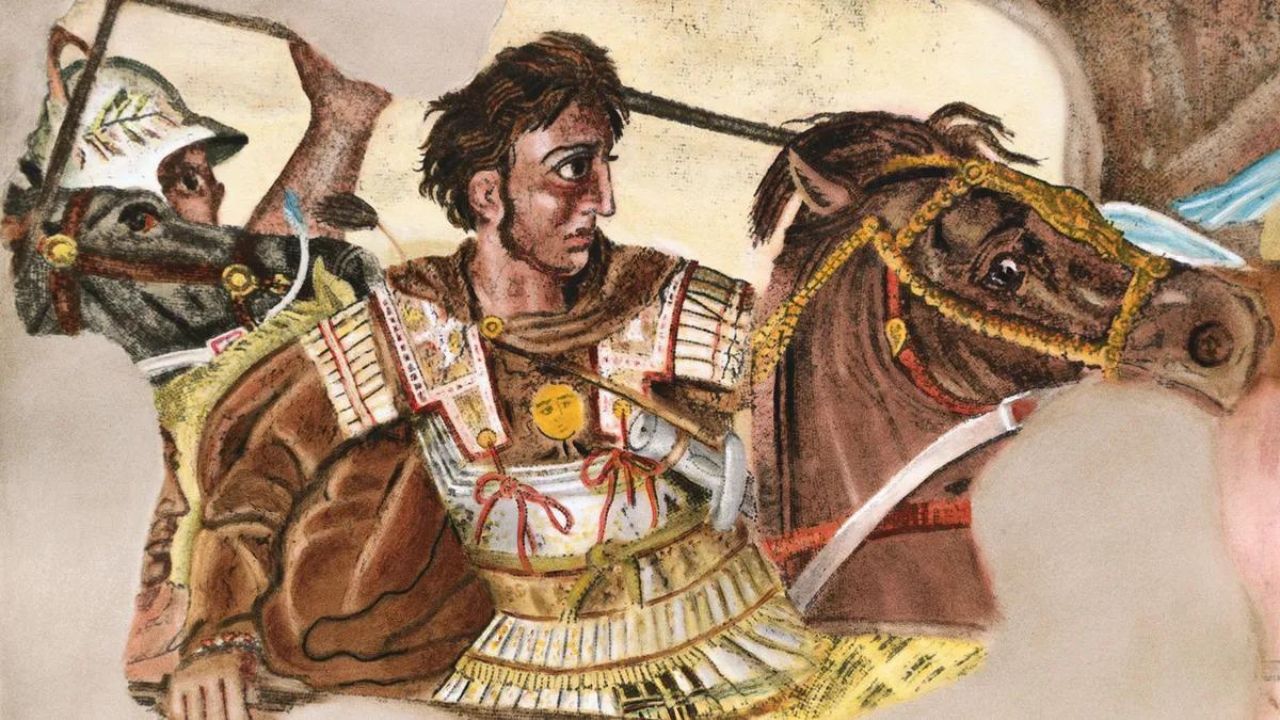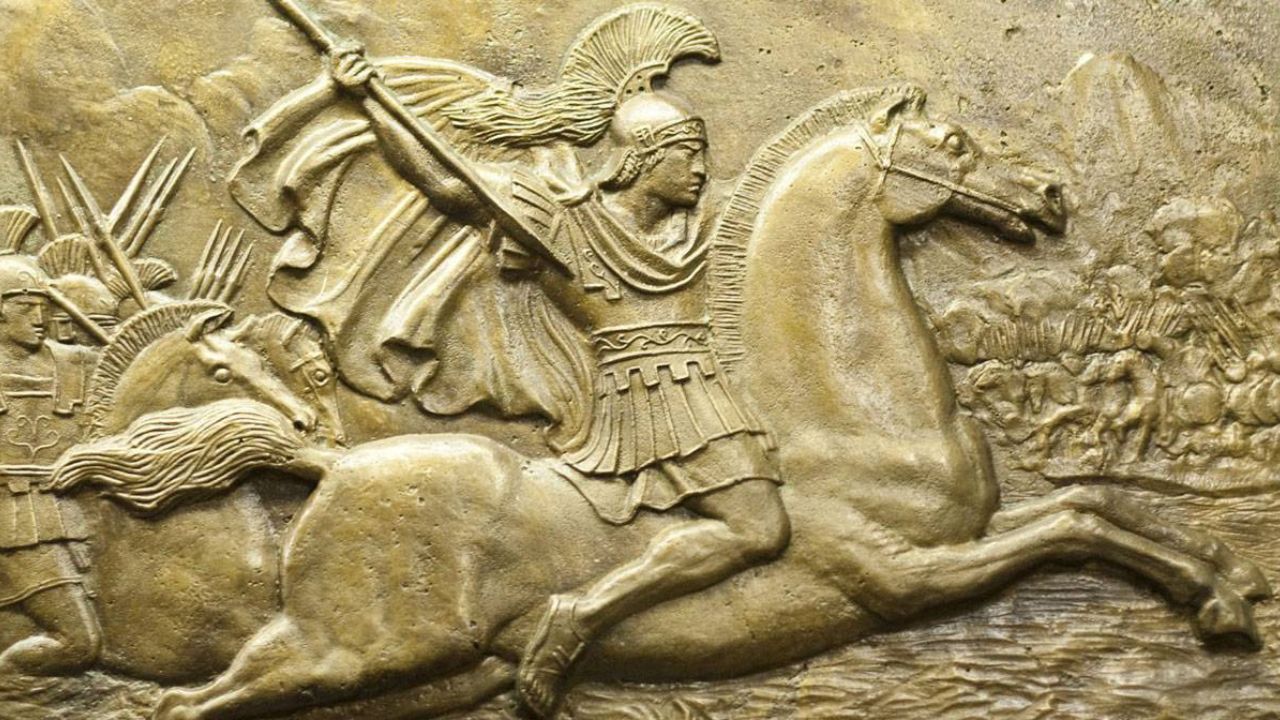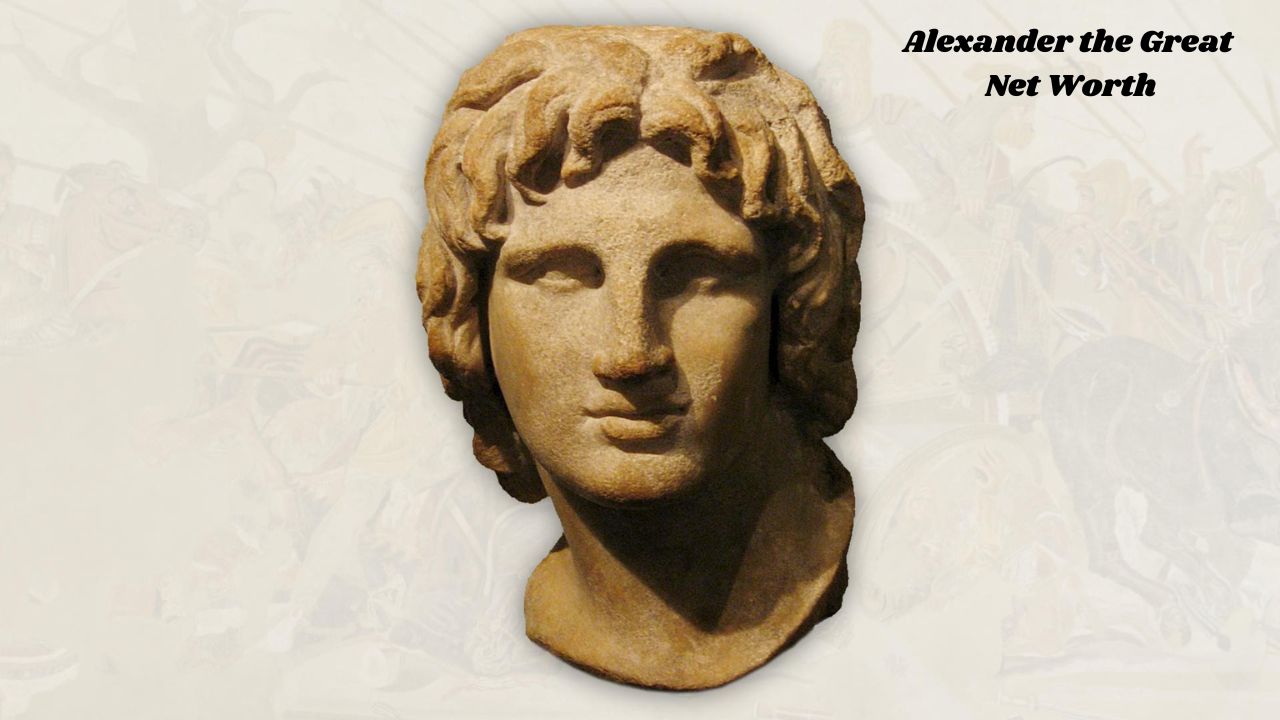Former king of Macedonia, Alexander the Great’s Net Worth adjusted for present-day is US$32 Trillion. Alexander III of Macedon, commonly known as Alexander the Great, was the king of the ancient Greek kingdom of Macedon.
Alexander the Great was undefeated in battle and is widely regarded as one of history’s greatest and most successful military commanders. Adjusted for inflation, Alexander is considered the second richest monarch of all time (the first being Genghis Khan). Check out Diora Baird’s Net Worth.
Quick Links
What is Alexander the Great’s Net Worth?
Alexander the Great’s net worth, adjusted for current times, is $32 trillion US Dollars. The value of the land owned by Alexander the Great is estimated to be over $20 trillion US Dollars. As king, Alexander had access to the regular income earned by his kingdom, including taxes, duties, and tribute.
| Net Worth | $32 Trillion |
| Horses | 100,000 |
| Castles Owned | 650 |
| Gold | $7 Trillion |
| Diamonds | $2 Trillion |
| Land | $20 Billion |

Value of Land Conquered by Alexander the Great
At his peak, Alexander the Great conquered and owned more than 10 million square miles of land spanning Asia and Europe. If you compare this land to its current market value, the land owned by Alexander the Great is estimated to be worth more than US$20 trillion. Must Check, Jacob Elordi’s Net Worth.
Lands Conquered by Alexander the Great
| Greece | 3 Million Square Miles |
| Albania | 2 Million Square Miles |
| Turkey | 1 Million Square Miles |
| Palestine | 4 Million Square Miles |
| Afghanistan and Pakistan | 1 Million Square Miles |
Alexander the Great had gold, diamonds, etc.
Alexander the Great had gold and gold reserves weighing more than 1 million tons. Alexander conquered mineral-rich lands in Egypt, Iran, etc., where precious metals are found in great quantities. This means that Alexander the Great must have had gold worth more than $30 billion.
Alexander’s Treasures
Alexander amassed a wealth of more than a trillion through victories in the battles of Granicus (334 BC) and Issus (333 BC). Much of this wealth was handled by Alexander’s childhood friend Harpalus. Ancient records show that Harpalus enriched himself, and fled, and yet Alexander later got him back and put him in charge of a large sum of money. You may also like Jamaal Bowman Net Worth.
Calculation of Value of Horses Owned by Alexander the Great
| 1. Number of Horses Owned | 100,000 |
| 2. Price of Each Horse (Current Value) | $3,000 |
| Value of Horses(1 X 2) | $300 Million |
Loot from India by Alexander
Alexander’s campaigns to forge alliances with Indian kings on the borders of his Persian Empire did not yield him much gold or wealth. However, Alexander did receive a large number of war elephants from Indian rulers. The Indian ruler Chandragupta Maurya gifted over 5,000 elephants to the Persian Empire. Maurya has gifted the Persian Empire with over 5,000 elephants.
About Alexander the Great’s Personal Life
Alexander was born in Pella, the capital of the Kingdom of Macedon, on the sixth day of the ancient Greek month of Hecatombion, which probably corresponds to 20 July 356 BC (although the exact date is uncertain). There are many legends about Alexander’s birth and childhood. In his early years, Alexander was raised by a nurse, Lanike, who was the sister of Alexander’s future general Cleitus the Black.
Alexander named his horse Bucephalus, meaning “bull’s head”, for Bucephalus led Alexander to India. When the animal died (according to Plutarch, of old age at the age of thirty), Alexander named a city after him, Bucephala. Philip chose Aristotle and provided the temple of the nymphs at Mieza as a classroom. You can also check Andrew Flintoff’s Net Worth.

Alexander the Great Battles
Alexander the Great began his reign by eliminating potential rivals to the throne. Attalus at the time was in correspondence with Demosthenes about the possibility of moving to Athens.
Alexander the Great stopped at Thermopylae, where he was recognized as the leader of the Amphictyonic League, before moving south to Corinth. Before crossing into Asia, Alexander the Great wanted to secure his northern borders. In the spring of 335 BC, he moved forward to suppress several revolts.
Starting from Amphipolis, he moved eastward into the country of the “Independent Thracians”; at Mount Haemus, the Macedonian army attacked and defeated the Thracian forces posted on the heights. Moving west into Illyria, Alexander the Great defeated each (the king of Illyria, King Glaukias) in turn, forcing both rulers to flee with their troops.
Alexander’s Culture
Alexander the Great adopted some elements of Persian dress and customs at his court, notably the practice of proskynesis, either the symbolic kissing of the hand or prostration to the ground, which Persians used to show to their social superiors. During the long rule of the Achaemenids, elite positions in many parts of the empire, including the central government, the military, and many satrapies, were reserved exclusively for Iranians and to a predominant degree Persian nobles.
Upon discovering that many of his satraps and military governors were misbehaving in his absence, Alexander the Great executed many of them as examples on his way to Susa. Back in Babylon, Alexander the Great planned several new campaigns, starting with the invasion of Arabia, but he did not have the chance to realize them, as he died shortly after Hephaestion. Also, check Peter Kay’s Net Worth.
Death of Alexander
On 10 or 11 June 323 BC, Alexander the Great died in Nebuchadnezzar II’s palace in Babylon at the age of 32. Alexander the Great suffered a fever, which worsened so much that he was unable to speak. In another account, Diodorus reports that Alexander the Great suffered pain after drinking a large bowl of unadulterated wine in honor of Heracles, after which he remained weak for 11 days; he did not have a fever but died after some suffering.
Many legends about Alexander the Great are associated with his lifetime, possibly encouraged by Alexander the Great himself. In the first centuries after the death of Alexander the Great, probably in Alexandria, a quantity of mythological material was collected into a text known as the Alexander Romance, later falsely attributed to Callisthenes and hence known as Pseudo-Callisthenes. Irish playwright Aubrey Thomas de Vere wrote Alexander the Great, A Dramatic Poem.
FAQs
He was undefeated in battle and is widely considered to be one of history’s greatest and most successful military commanders.
King Porus of Paurava blocked Alexander’s advance at a ford on the Hydaspes River in the Punjab.
His army, exhausted, homesick, and anxious by the prospects of having to face large Indian armies throughout the Indo-Gangetic Plain, mutinied at the Hyphasis and refused to march further east.
In 15 years of conquest, Alexander never lost a battle.
10 or 11 June 323 BC (aged 32).
Roxana (m. 327 BC–323 BC). Stateira (m. 324 BC–323 BC).Parysatis II (m. 324 BC–323 BC).

